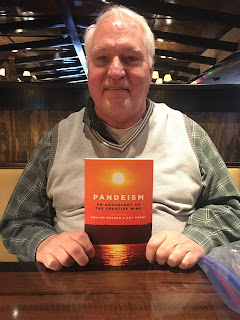As the next book from the
Pandeism Anthology series,
Pandeism: An Anthology of the Creative Mind, will come out in August 2019, we are reflecting on a unique aspect of this series -- that we invite people of differing and even anti-pandeistic views to publish their views in our collections. Our first
Anthology covered perspectives including Hinduism, Islam, Biblical Unitarian Universalism, and Atheism. Our second has pieces from perspectives including Judaism and Stoicism.
One topic which we intend to cover in a future writing is the interesting relationship between Pandeism and Catholicism. The position of the Church as to Pandeism is addressed to a degree in the
Catechism of the Catholic Church, a work intended to be comprehensive, as such things go, in presenting the positions of the Roman Catholic Church on issues needing addressing. Within it, Part 1, Section 2, Chapter 1, Article I, addresses a certain set of philosophies thusly:
285 Since the beginning the Christian faith has been challenged by responses to the question of origins that differ from its own. Ancient religions and cultures produced many myths concerning origins. Some philosophers have said that everything is God, that the world is God, or that the development of the world is the development of God (Pantheism). Others have said that the world is a necessary emanation arising from God and returning to him. Still others have affirmed the existence of two eternal principles, Good and Evil, Light and Darkness, locked, in permanent conflict (Dualism, Manichaeism). According to some of these conceptions, the world (at least the physical world) is evil, the product of a fall, and is thus to be rejected or left behind (Gnosticism). Some admit that the world was made by God, but as by a watch-maker who, once he has made a watch, abandons it to itself (Deism). Finally, others reject any transcendent origin for the world, but see it as merely the interplay of matter that has always existed (Materialism). All these attempts bear witness to the permanence and universality of the question of origins. This inquiry is distinctively human.
Now I do grant that there are a great many metatheoretical theological variations out there, so it might seem unfair to ask that this Catechism cover all of them. But in higher circles of theological thought, both Panentheism and Pandeism are long-standing enough (both coined in Germany by the mid-1800s) and well-enough known that they at least merit passing mention in a work intended or supposed to be comprehensive as to Catholic thought. But perhaps, just as the reference to the 'myths' of those "ancient religions and cultures" is likely intended to encompass Polytheism without needing mention it by name, perhaps it is assumed that other theologies not mentioned by name are encompassed by those that are. There is, after all, commentary upon the notion that "the development of the world is the development of God" parenthesized as Pantheism (one element of Pandeism), though Pantheism alone does not encompass all formulations of this conception. And there is commentary upon Deism (the other element of Pandeism), though many species of Deist would take issue with the summary as eliding the deistic property of a deity discernible by reasoned examination of our Universe, such that even those never privy to one of the claimed divine revelations could discover this possibility.
Panentheism, interestingly, may have gone unaddressed for another reason altogether -- that being that there is often reason to correlate Catholic doctrine with Panentheism more than with pure Theism, as Panentheism pairs the theistic aspects of an overseeing, intervening deity with the pantheistic properties of everything within the Universe itself being "within God." Such assertions have not gone without controversy, as there are those within the Church who dismiss elements of Panentheism, and at the same time fret and grumble when others within the Church embrace those elements and deem them doctrinally sound. But this dissension is mild compared to those "renegade" elements of the Church who decry the movement of the larger body as a shift towards Pandeism itself, and go so far as to accuse Pope Francis of being a secret (or not-so-secret) Pandeist in his own right.
But this modern quandary had escaped mention in the Catechism itself. In fact, the Catechism's dismissal of the parts of Pandeism without considering the whole eerily mirrors that of Richard Dawkins, who otherwise stands quite opposite the Catholic Church in its conclusions. Dawkins put it somewhat more abruptly, even, contending that "Pantheism is sexed-up atheism. Deism is watered-down theism." Reading the Church's summaries of these philosophies, it is hard to imagine that the Catechism's authors would at all disagree with Dawkins' characterizations on this score, and would quite likely agree with whatever characterization Dawkins might arrive at as to Pandeism as well.






